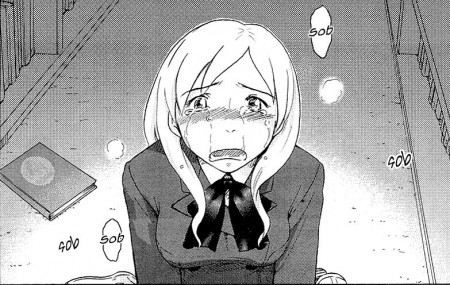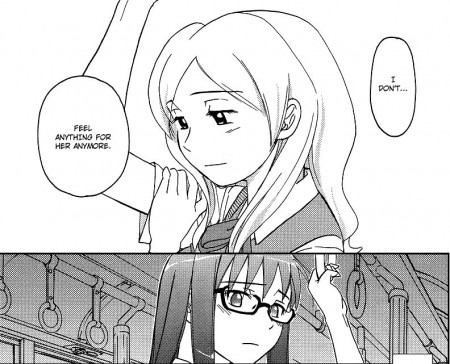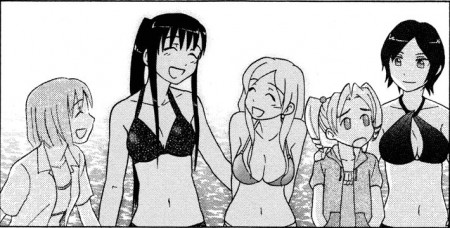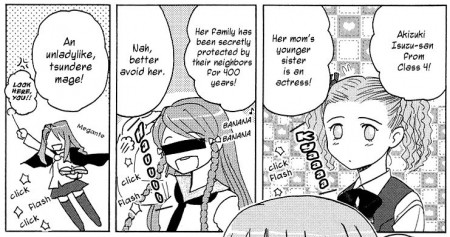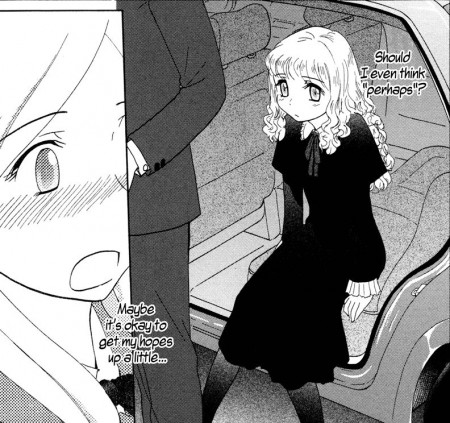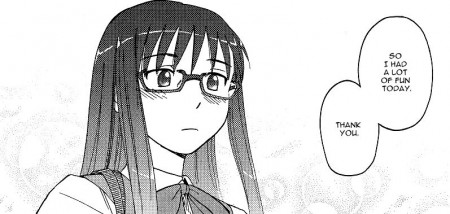Thoughts on Whispered Words volume 1
Approaching Takashi Ikeda’s lesbian-tinged romantic comedy manga Whispered Words (Sasameki Koto) is a bit of a challenge because objective review of the series is difficult to separate from a natural American predisposition. Any popular culture media in America that treats homosexual relationships sympathetically without being pornographic practically automatically earns some respect and praise. So Whispered Words almost receives automatic credit just for approaching female homosexuality in a positive light. However, a rational, objective examination of the series reveals that the first English translated omnibus volume from One Peace Books is enjoyable nearly in spite of itself. The manga feels as though author Ikeda has a strong foundational concept but struggles to find a precise focus for the story’s tone and attitude.
Whispered Words is a humorous slice-of-life drama about a pair of high school girl best friends. Ushio does little to hide her attraction to “cute” feminine girls. Her best friend Sumika is tall and athletic and loves Ushio deeply but assumes that Ushio will never respond in kind because Sumika isn’t conventionally “cute” and ultra-feminine. As the story proceeds, a lesbian couple of classmates, a cross-dressing boy with an unrequited crush on Sumika, a girl with an idealized vision of lesbian love, and a petite, blonde German exchange student fill out the cast of the first omnibus. A romantic comedy, whether about heterosexual or homosexual relationships, needs to be funny. Whispered Words does maintain a consistent lighthearted tone filled with plenty of situational humor. However, the series frequently feels as though it ought to be, and wants to be a bit more affective, sentimental, and melancholy. The storyline’s tendency to gloss over situations that should be more affecting, and the series’ tendency for revolving door supporting characters gives the narrative a bit of an uneven, superficial tone.
The story is largely told from Sumika’s perspective, and viewers are only given consistent access to Sumika’s thoughts and motivations. The girl’s constant pining for the affection of her friend evokes a dramatic, bittersweet tone very comparable to Takako Shimura’s Aoi Hana manga. However, especially throughout the first two-thirds of the initial collected volume, Whispered Words never seems fully willing to commit to the seriousness and drama that it hints at. Rather, the story almost feels spurious about its lesbian theme. Taking such a serious and potentially controversial affection so lightly almost feels irresponsible and disrespectful. The manga’s very first chapter depicts the dual elating and heartbreaking sides of lesbian attraction. However, after that first illustration the story stops treating lesbian attraction seriously and uses it as a stock trope, a narrative crutch for sitcom for several hundred subsequent pages. The story introduces cross-dressing classmate Masaki Akemiya who is attracted to Sumika and, when in drag, is an object of obsession for Ushio. But the story does nothing of substance with the character and summarily drops him out of the story to make way for Azusa Aoi, another supporting character that gets slightly more sympathetic treatment but no greater narrative substance. Finally, toward the end of the first omnibus volume the relationship between Sumika and Ushio seems to begin to develop and an undercurrent of character depth and relationship begins to emerge to underlie the frivolous comedy.
One Peace Book’s first 472-page volume reprints the first three Japanese volumes of the nine-volume series. The substantial tome has an attractive color cover and all monochrome interior pages. Print quality is crisp and clean, although the first page of the first chapter and the first page of the second chapter exhibit minor ink blotches in the printing. The translation is fluid and natural, although I spotted 15 minor typos through the massive book. Ideally a professional, commercial publication should be perfect, but 15 small errors in such a big book should be forgivable from a small, indie publisher that may not have the resources to ensure flawless quality control. Furthermore, the translation has a frequent tendency to split words without using hyphens in order to fit the existing word balloons. The practice sometimes makes reading the dialogue a bit needlessly difficult.
Ikeda’s manga includes a number of subtle manga in-jokes, including references to other manga like Ashita Tenki ni Naare, Mister Ajiko, Zero no Tsukaima, and Kage Kara Mamoru that aren’t explained by footnotes or translation notes, but the references integrate into the narrative naturally, so readers that “get” the jokes are rewarded, and readers that don’t won’t notice anything amiss. Visual sound effects are retained intact and are unobtrusively translated. The manga doesn’t contain any graphic violence, offensive language, or graphic sexuality beyond a few girl-with-girl kisses. Brief nudity is entirely non-graphic.
Readers that want a serious, intense or dramatic lesbian romance story may be better served with titles like Takako Shimura’s Aoi Hana and Kishi Torajiro’s Maka Maka. Most of the first omnibus volume of Whispered Words is lighthearted romantic comedy comparable to Ruri Miyahara’s Love Lab, except with an undercurrent of lesbianism. Readers may, in fact, feel as though the manga should be a bit more serious at times. The story reveals Sumika’s emotional distress, but the surrounding story doesn’t match the weight and tone of that distraught affection. But as a light romantic comedy that varies from the norm by diverging from conventional heterosexual couplings, Whispered Words works just fine and is pleasantly enjoyable.
For further reference, the first omnibus volume of the manga provides the source material for the first 11 (out of 13) episodes of the 2009 “Sasameki Koto” anime television series.

